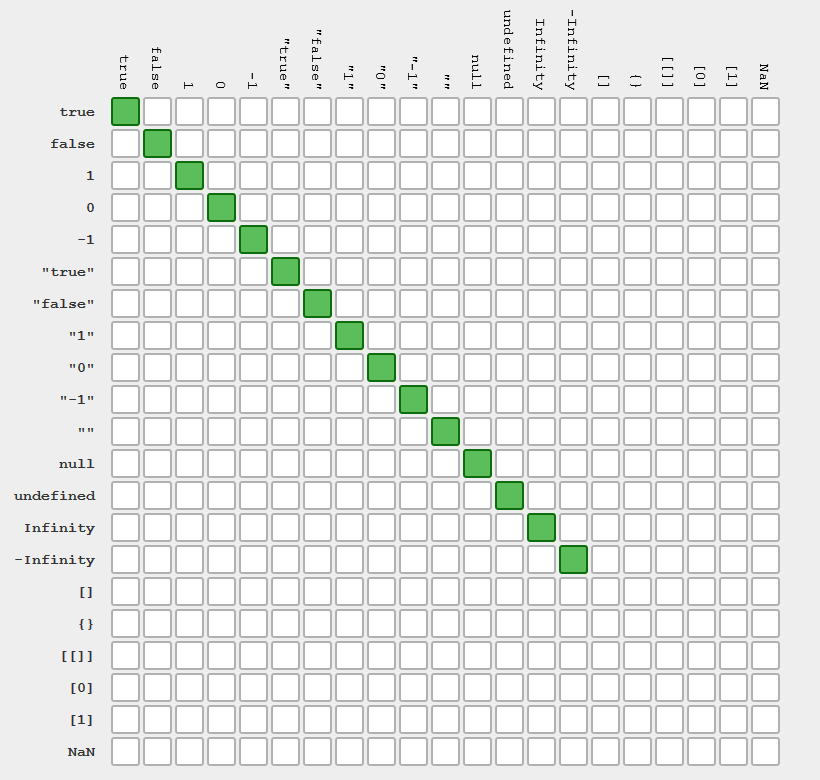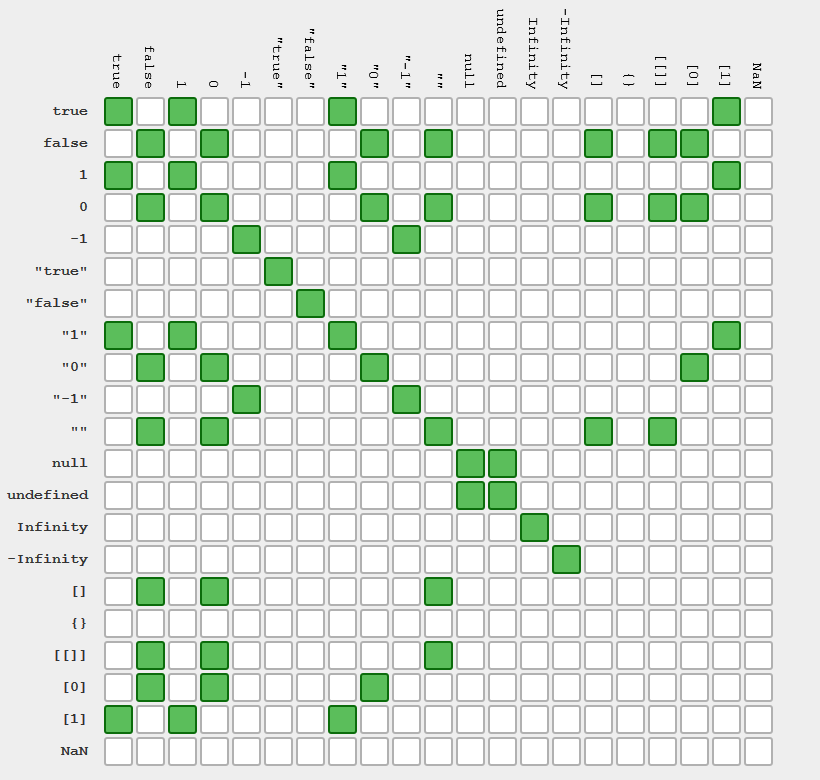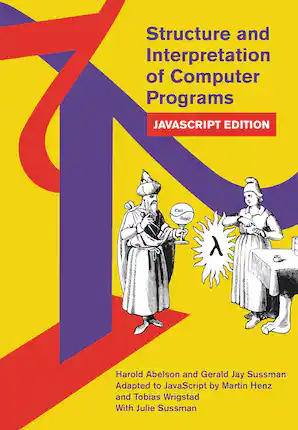“I was recruited to Netscape with the promise of doing Scheme in the browser”
| Racket (PLT Scheme) | JavaScript |
|---|---|
(define (squares n)
(for/stream ([x (in-range n)])
(* x x)))
(writeln (stream->list (squares 10)))
; (0 1 4 9 16 25 36 49 64 81) |
function* squares(n) {
for (let x = 0; x < n; ++x) {
yield x * x;
}
}
console.log(Array.from(squares(10)));
// [ 0, 1, 4, 9, 16, 25, 36, 49, 64, 81 ] |
- Designed and implemented as LiveScript over 10 days in 1995 by Brendan Eich at Netscape
- Main influences:
- Scheme (Functions)
- Self (Prototypes)
- Java (Syntax)
- Perl (Regular expressions)
- Released in 1996 as JavaScript® for marketing purposes
- Registered trademark of Oracle America Inc.
- Standardized as ECMAScript in 1997 (European Computer Manufacturers Association)
- Long version gap between 2005 and 2015
- Time for browser implementers to catch up
- Yearly releases since 2015 (ES6)
<!DOCTYPE html>
<html>
<head>
<meta charset="UTF-8">
<link rel="stylesheet" href="pretty.css">
<script type="text/javascript" src="bundle.js"></script>
</head>
<body>
<div style="display: flex">
<textarea id="output" style="flex: 0px" rows="50"></textarea>
</div>
</body>
<script type="text/javascript">
// ...
let response = await fetch("https://raw.githubusercontent.com/frectures/js/master/README.md");
let text = await response.text();
document.getElementById("output").value = text;
// ...
</script>
</html>- Browser (frontend)
- HTML (HyperText Markup Language)
- CSS (Cascading Style Sheets)
- JS (JavaScript)
- DOM (Document Object Model)
- Node.js (backend)
- JavaScript runtime environment built on Chrome's V8 JavaScript engine
- High-performance, asynchronous server code
- Electron = Chromium + Node.js (cross-platform desktop applications)
- Atom
- Discord
- Microsoft Teams
- Skype
- Visual Studio Code
- Dynamically typed
- Primitives
undefined- uninitialized variables
- function calls without return value
- missing function arguments
- missing object properties
- array index out of bounds
booleanfalsetrue
number(double precision floating point)0.1 + 0.2 == 0.30000000000000004- Contains all integers up to 253 =
9_007_199_254_740_992
bigint(arbitrary precision integer)123nBigInt(456)
string(UTF-16)"Ain't no sunshine"'The cow says: "Moo"'`Frantic fans: "It's great!"`
null
ObjectFunctionArray- ...
“Choosing JavaScript was deeply ironic for me, as many readers may know, I'm not a fan of it. It has too many awkward edge cases and clunky idioms. But the compelling reason for choosing it over Java is that isn't wholly centered on classes. There are top-level functions, and use of first-class functions is common. This makes it much easier to show refactoring out of the context of classes.”
typeof undefined === "undefined"
typeof false === "boolean"
typeof 3.14 === "number"
typeof 123n === "bigint"
typeof "hello" === "string"
typeof "hi"[0] === "string" 🤔
typeof null === "object" 🤔
typeof {} === "object"
typeof Math.log === "function"
typeof [] === "object" 🤔
Array.isArray([]) === truevarvariables have function scope:
function f() {
// ... // scope of x
{ //
// ... //
var x = 42; //
// ... //
} //
// ... //
} letvariables have block scope:
function f() {
// ...
{
// ...
let x = 42; // scope of x
// ... //
}
// ...
} constrequires initialization and forbids assignment:
function f() {
const uninitialized; // error: const requires initialization
const x = 42;
x = 97; // error: const forbids assignment
const account = new Account();
account.deposit(42); // ok: method call is not assignment
account = new Account(); // error: const forbids assignment
}- Type-safe equality via
===and!==(compares type and value)
- Type-unsafe equality via
==and!=(confusing type coercions)
- There is no universal
equalsmethod for object equality
condition ? "truthy" : "falsy"- All falsy values:
undefinedfalseNaN+0.0-0.00n""null
- All other values are truthy
let coin;
if (Math.random() < 0.5) {
coin = "heads";
} else {
coin = "tails";
}
const coin = Math.random() < 0.5 ? "heads" : "tails";switch (expression) {
case 42: // ...
break;
case "hello": // ...
break;
case true: // ...
break;
case f(): // ...
break;
default: // ...
}for (let i = 0; i < s.length; ++i) {
console.log(s[i]);
}
let x = 1;
while (x + 1 > x) {
x *= 2;
}
console.log(x + " is the smallest integer without odd successor");
let password;
do {
password = readPassword();
} while (password !== "Simsalabim");try {
// ...
} catch (ex) {
// ...
} finally {
// ...
}- A single
catchblock catches all exceptions - At least one of
catchandfinallymust be present - All JavaScript values, including primitives, can be thrown
throw null;
throw undefined;
throw true;
throw 42.0;
throw "string literal";
throw new Error("error object");
throw { message: "object literal" };
throw function () { };function f(x, y) {
return (x + y) / 2;
}
const g = function (x, y) {
return (x + y) / 2;
};function fdoes not prevent accidental reassignment:f = "uh oh";😱
const g = functioncannot be called above its definition- Missing arguments are initialized to
undefined - Extra arguments are ignored
- Implicit
return undefined;at the bottom
- Can we extract the essence of
fixCosandfixSqrtinto onefixfunction?
| fixCos | fixSqrt |
|---|---|
function fixCos() {
let x = 0.0;
do {
// 0
// 1
// 0.5403023058681397
console.log(x);
// 0.7390851332151608
// 0.7390851332151606
// 0.7390851332151607
} while (x !== (x = Math.cos(x)));
return x;
}
fixCos(); |
function fixSqrt() {
let x = 0.5;
do {
// 0.5
// 0.7071067811865476
// 0.8408964152537146
console.log(x);
// 0.9999999999999997
// 0.9999999999999998
// 0.9999999999999999
} while (x !== (x = Math.sqrt(x)));
return x;
}
fixSqrt(); |
- Yes, by abstracting over
fandx:
function fix(f, x) {
do {
console.log(x);
} while (x !== (x = f(x)));
return x;
}
fix(Math.cos, 0.0);
fix(Math.sqrt, 0.5);- Functions are first class, hence functions can be:
- passed as arguments
- returned as results
- stored in properties
function makeCounter() {
let next = 1;
return function () {
return next++;
};
}
const counter = makeCounter();
console.log(counter()); // 1
console.log(counter()); // 2
console.log(counter()); // 3- Functions have access to their surrounding context
- Even after the enclosing function has returned!
function makeCounter() {
let next = 1;
return () => next++;
}- Great fit as arguments to higher-order functions:
fix(x => Math.pow(x, 0.5), 0.5);- JavaScript hipsters prefer arrow functions everywhere:
const average = (x, y) => (x + y) / 2;Even though ECMAScript includes syntax for class definitions, ECMAScript objects are not fundamentally class-based such as those in C++, Smalltalk, or Java
- A JavaScript object is essentially a
java.util.LinkedHashMap<String, Object> - Quotation marks around keys in object literals are optional
// object literal
const inventor = { "surname": "Eich", forename: "Brendan" };
// access properties
inventor.forename // 'Brendan'
inventor["surname"] // 'Eich'
// add properties
inventor["year"] = 1961; // { surname: 'Eich', forename: 'Brendan', year: 1961 }
inventor.language = "JavaScript"; // { surname: 'Eich', forename: 'Brendan', year: 1961, language: 'JavaScript' }
// remove properties
delete inventor.forename; // { surname: 'Eich', year: 1961, language: 'JavaScript' }- Properties are accessed:
- unquoted after dot, or
- quoted inside brackets
- Objects are class-free
- Properties can be added and removed at will
function createAccount(initialBalance, accountId) {
return {
balance: initialBalance,
id: accountId,
deposit: function (amount) {
this.balance += amount;
},
getBalance: function () {
return this.balance;
},
};
}
const account = createAccount(1000, 42);
// { balance: 1000, id: 42, deposit: [Function: deposit], getBalance: [Function: getBalance] }
account.deposit(234);
account.getBalance() // 1234
createAccount(1234, 42).getBalance === account.getBalance // falseconst accountMethods = {
deposit: function (amount) {
this.balance += amount;
},
getBalance: function () {
return this.balance;
},
};
function createAccount(initialBalance, accountId) {
return {
__proto__: accountMethods,
balance: initialBalance,
id: accountId,
};
}
const account = createAccount(1000, 42);
// { balance: 1000, id: 42 }
account.__proto__
// { deposit: [Function: deposit], getBalance: [Function: getBalance] }
account.deposit(234);
account.getBalance() // 1234
createAccount(1234, 42).getBalance === account.getBalance // true- Read access
obj.mstarts atobjand climbs the inheritance chain:obj.mobj.__proto__.mobj.__proto__.__proto__.mobj.__proto__.__proto__.__proto__.m- etc. until
mis found (or__proto__isnull)
- Write access
obj.m = ...ignoresobj.__proto__
function Account(initialBalance, accountId) {
this.balance = initialBalance;
this.id = accountId;
}
// Account.prototype = { constructor: Account };
Account.prototype.deposit = function (amount) {
this.balance += amount;
};
Account.prototype.getBalance = function () {
return this.balance;
};
/* Account.call({ __proto__: Account.prototype },
1000, 42) */
const account = new Account(1000, 42);
// Account { balance: 1000, id: 42 }
account.__proto__
// { deposit: [Function (anonymous)], getBalance: [Function (anonymous)] }
account.deposit(234);
account.getBalance() // 1234
new Account(1234, 42).getBalance === account.getBalance // true- By convention, functions starting with an uppercase letter are constructor functions
- Must be invoked with
newto create{ __proto__: F.prototype } - Otherwise,
thisisundefined
- Must be invoked with
- Every function has an associated
prototypeproperty- But it's only useful for constructor functions
| Function call syntax | this |
|---|---|
f(x, y, z) |
undefined |
obj.f(x, y, z) |
obj |
new F(x, y, z) |
{ __proto__: F.prototype } |
f.apply(obj, [x, y, z]) |
obj |
f.call(obj, x, y, z) |
obj |
f.bind(obj)(x, y, z) |
obj |
class Account {
constructor(initialBalance, accountId) {
this.balance = initialBalance;
this.id = accountId;
}
deposit(amount) {
this.balance += amount;
}
getBalance() {
return this.balance;
}
}
const account = new Account(1000, 42);
// Account { balance: 1000, id: 42 }
account.__proto__ // {}
account.__proto__ === Account.prototype // true
account.__proto__.deposit // [Function: deposit]
account.__proto__.getBalance // [Function: getBalance]- JavaScript has no runtime notion of classes
- The
classkeyword merely coats syntactic sugar over the prototype system
const primes = [2, 3, 5, 7];
typeof primes // 'object'
Object.getOwnPropertyNames(primes) // [ '0', '1', '2', '3', 'length' ]
primes.length // 4
primes[0] // 2
primes[4] // undefined
primes[4] = 11; // [ 2, 3, 5, 7, 11 ]
primes.push(13); // [ 2, 3, 5, 7, 11, 13 ]
primes.push(17, 19); // [ 2, 3, 5, 7, 11, 13, 17, 19 ]
primes[24] = 97; // [ 2, 3, 5, 7, 11, 13, 17, 19, <16 empty items>, 97 ]
primes.length = 5; // [ 2, 3, 5, 7, 11 ]
primes.pop(); // [ 2, 3, 5, 7 ]- JavaScript arrays are JavaScript objects with a special
lengthproperty- The keys are stringified numbers
- The (mutable!)
lengthproperty is the largest index +1 - There are no "array index out of bounds" errors:
- Reading from such an index gives
undefined - Writing to such an index grows the array
- Reading from such an index gives
for (let i = 0; i < primes.length; ++i) {
console.log(primes[i]);
}
primes.forEach(function (element, index, array) {
console.log(element);
});
for (const p of primes) {
console.log(p);
}// sort objects by their toString representation
primes.sort();
// [ 11, 13, 17, 19, 2, 3, 5, 7 ]
// sort numbers by their numeric value
primes.sort((a, b) => a - b);
// [ 2, 3, 5, 7, 11, 13, 17, 19 ]const people = [
{ forename: "Alan", surname: "Turing", year: 1912 },
{ forename: "Alan", surname: "Kay", year: 1940 },
{ forename: "Bjarne", surname: "Stroustrup", year: 1950 },
{ forename: "Brian", surname: "Kernighan", year: 1942 },
{ forename: "Dennis", surname: "Ritchie", year: 1941 },
{ forename: "James", surname: "Gosling", year: 1955 },
];
const whippersnappers = people.filter(person => person.year >= 1950);
const years = people.map(person => person.year);
const yearSum = people.reduce((sumSoFar, person) => sumSoFar + person.year, 0);
const sortedByYear = people.toSorted((a, b) => a.year - b.year);
const sortedBySurname = people.toSorted((a, b) => a.surname.localeCompare(b.surename));- Not all JavaScript environments provide
toSortedyet - In that case, we can monkey-patch it into the prototype:
if (Array.prototype.toSorted === undefined) {
Array.prototype.toSorted = function (compare) {
// spread operator
const copy = [...this];
copy.sort(compare);
return copy;
};
}- One file per module
- Explicit
exports andimports - Browsers support modules via
<script type="module" src="app.js">from web server - But modules are usually bundled into a single
bundle.jsfile by module bundlers like Webpack
// trig.js
export const PI = 3.141592653589793;
const RADIANS_PER_DEGREE = PI / 180; // not exported
export function radians(degrees) {
return degrees * RADIANS_PER_DEGREE;
}
export function degrees(radians) {
return radians / RADIANS_PER_DEGREE;
}
export function distance(x, y) {
return Math.sqrt(square(x) + square(y));
}
// not exported
function square(x) {
return x * x;
}// app.js
import { PI, distance as distanceFromOrigin } from './trig';
const distance = 1.5;
console.log(PI);
console.log(distanceFromOrigin(3, 4));// app.js
import * as trig from './trig';
const distance = 1.5;
console.log(trig.PI);
console.log(trig.distance(3, 4));






